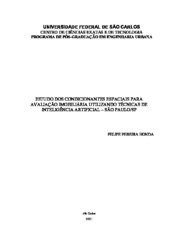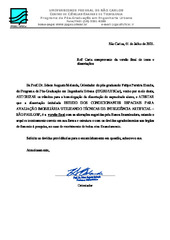| dc.contributor.author | Honda, Felipe Pereira | |
| dc.date.accessioned | 2021-07-13T17:42:05Z | |
| dc.date.available | 2021-07-13T17:42:05Z | |
| dc.date.issued | 2021-04-01 | |
| dc.identifier.citation | HONDA, Felipe Pereira. Estudo dos condicionantes espaciais para avaliação imobiliária utilizando técnicas de inteligência artificial – São Paulo/SP. 2021. Dissertação (Mestrado em Engenharia Urbana) – Universidade Federal de São Carlos, São Carlos, 2021. Disponível em: https://repositorio.ufscar.br/handle/ufscar/14587. | * |
| dc.identifier.uri | https://repositorio.ufscar.br/handle/ufscar/14587 | |
| dc.description.abstract | The increase in the supply of real estate in recent years has influenced the increase in credit, and, however, has raised sales prices. However, the measurement of real estate values is still a very complex process, as it is influenced by numerous factors, among them physical, geolocation and political-economic. Thus, the objective of this research is to present which variables are relevant in the formation of the value of urban properties using artificial intelligence technique. It was decided to use the decision tree technique for mining and statistical analysis, created from the Randon Forest algorithm. Through mining it was possible to notice that there is a strong correlation between the categories and subcategories analyzed, and, however, the influence they have on the formation of the value of urban properties in the 32 administrative regions of the municipality. Among the factors that had the greatest influence on the value of the properties were the proximity to Shopping Centers, police stations, areas where geological hazards occur, slums, consulates, fire departments and train stations. It was also found that the different environmental aspects, positive and negative, influence the real estate valuation and that the adopted methodology is efficient in the evaluation of large databases, as well as an important tool for decision making and for urban planning. | eng |
| dc.description.sponsorship | Coordenação de Aperfeiçoamento de Pessoal de Nível Superior (CAPES) | por |
| dc.language.iso | por | por |
| dc.publisher | Universidade Federal de São Carlos | por |
| dc.rights | Attribution-NonCommercial-NoDerivs 3.0 Brazil | * |
| dc.rights.uri | http://creativecommons.org/licenses/by-nc-nd/3.0/br/ | * |
| dc.subject | Mineração de dados | por |
| dc.subject | Inteligência artificial | por |
| dc.subject | Valorização imobiliária | por |
| dc.subject | Data mining | eng |
| dc.subject | Artificial intelligence | eng |
| dc.subject | Real estate valuation | eng |
| dc.title | Estudo dos condicionantes espaciais para avaliação imobiliária utilizando técnicas de inteligência artificial – São Paulo/SP | por |
| dc.title.alternative | Study of space conditions for real estate evaluation using artificial intelligence techniques - São Paulo/SP | eng |
| dc.type | Dissertação | por |
| dc.contributor.advisor1 | Melanda, Edson Augusto | |
| dc.contributor.advisor1Lattes | http://lattes.cnpq.br/1554762456965991 | por |
| dc.description.resumo | O aumento da oferta de imóveis nos últimos anos influenciou no aumento do crédito, e, contudo, elevou os preços de venda. Todavia, a mensuração dos valores de imóveis ainda é um processo bastante complexo, pois é influenciado por inúmeros fatores, dentre eles físicos, geolocalização e político-econômicos. Deste modo, o objetivo desta pesquisa foi apresentar quais variáveis são relevantes na formação do valor de imóveis urbanos utilizando técnica de inteligência artificial. Optou-se por utilizar a técnica de árvore de decisão para mineração e análise estatística, criada a partir do algoritmo Randon Forest. Através da mineração foi possível notar que existe uma forte correlação entre as categorias e subcategorias analisadas, e, sobretudo, a influência que exercem na formação do valor de imóveis urbanos nas 32 regiões administrativas do município. Dentre os fatores que apresentaram maior influência no valor dos imóveis foram a proximidade à Shopping Centers, postos policiais, áreas de ocorrência de riscos geológicos, favelas, consulados, corpo de bombeiros e estações de trem. Verificou-se também que os diferentes aspectos ambientais, positivos e negativos, influenciam na valorização imobiliária e que a metodologia adotada se mostra eficiente na avaliação de grandes bancos de dados, assim como, uma importante ferramenta para tomada de decisão e para o planejamento urbano. | por |
| dc.publisher.initials | UFSCar | por |
| dc.publisher.program | Programa de Pós-Graduação em Engenharia Urbana - PPGEU | por |
| dc.subject.cnpq | ENGENHARIAS | por |
| dc.description.sponsorshipId | CAPES: Código de Financiamento 001 | por |
| dc.publisher.address | Câmpus São Carlos | por |
| dc.contributor.authorlattes | http://lattes.cnpq.br/8554345401299021 | por |


